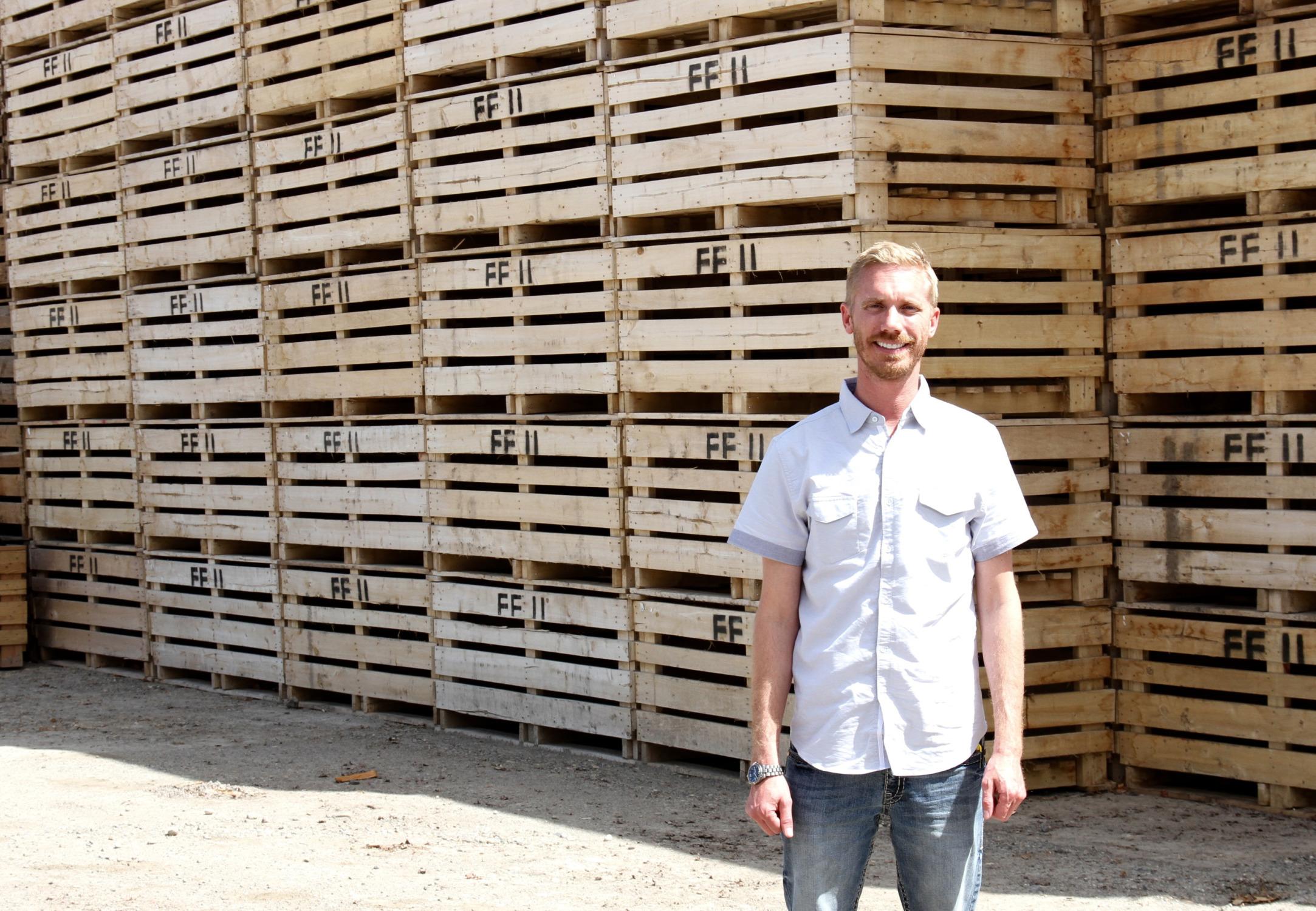
Third generation farmer Shay Myers is general manager of Owyhee Produce. He made the decision to move his business from Oregon to Idaho after the roofs of several onion storage sheds collapsed under heavy snow this winter.
Amanda peacher / OPB
Third-generation farmer Shay Myers thought his onion-packing sheds would be OK through last winter, even as other Malheur County buildings were collapsing under the weight of epic, heavy snow.
The Owyhee Produce buildings were relatively new construction. Myers believed they’d hold even as 3 feet and then nearly 4 feet of snow piled on top of the metal roofs.
He was wrong.
Owyhee Produce is a family-owned farm operation that specializes in packing onions and asparagus and one of several onion-packing facilities in the small farming town of Nyssa, Oregon.
Nyssa (population 3,000) is in the heart of eastern Oregon onion country, where the locally grown crop is cleaned and packed after spending the winter in tall, airy sheds.
On Jan. 18, the snow came down thick and fast. Shortly before noon, one of Myers’ employees checked the sheds to make sure none were bowing under the weight. At the time, everything looked fine. But soon, an employee came running into Myers' office, interrupting a family board meeting.
“Shed two collapsed!” she shouted.
Myers and his family rushed outside. A huge portion of the shed was reduced to a pile of wood and metal debris. Thousands of onions spilled out into the snow. That was the first of four buildings Owyhee Produce would lose to the snow.

Shay Myers stands at site (now cleared) where the roof caved in on one of his onion storage sheds in Nyssa.
Amanda Peacher / OPB
Reconstruction: Idaho Or Oregon?
This spring, the quiet agricultural community of Nyssa showed few lingering signs of the traumatic winter that damaged or destroyed at least 60 buildings here.
A pile of rubble still needed to be cleared off Main Street — the remains of a local dance studio. A few blocks away, several houses still had plastic tarps stretched over gaping holes in roofs. On the edge of town, a tall metal farm silo had buckled under the snow; it looked like an empty soda can that’s been squeezed at the middle.
But the community was moving forward. Fresh onion starts, the king crop in this part of eastern Oregon, spread lush and green over miles and miles of fields that surround the town.
"This is a resilient, close-knit community," said Jim Maret, Nyssa's city manager. "We came together tremendously during the snow storm, and we're moving forward."
Owyhee Produce was one of five major onion packing sheds that saw huge losses from winter damage. Myers is one of the lucky ones — his insurance coverage included snow damage, and the cost to rebuild will be covered.
Related: FEMA Rejects Oregon's Request To Assist Rural Counties Slammed By Winter Storms
But the destruction forced the question of where to rebuild. Ultimately, Myers decided to make the move from Oregon to Idaho. At least one other packing shed and a number of other eastern Oregon businesses are also moving across the border. Their reasons vary business by business, but many cite the increasing cost of doing business in Oregon.
“When somebody has to invest half a million to a million in business, they start going through the details of 'Well, will this cost my business in the long run?'” said Kit Kamo, executive director of the Snake River Economic Development Alliance.
Myers decided to rebuild his sheds just across the border into Idaho, just a three-minute drive from his Oregon location. The 1-mile move will ultimately add up to huge savings for his business.
“We’re competing with packing facilities and operators that are in Idaho that have a federal minimum wage,” Myers said.
Even though many agricultural businesses in Idaho pay more than the federal minimum of $7.25 an hour, it's typically still less than Oregon’s current $9.25 minimum wage, Myers said. Last year, the Oregon Legislature voted to raise that wage to $12.50 in five years for rural communities such as Malheur County.
“When you add that much more to the labor costs, you’re unable to compete with either your neighbor states or with the imports coming from other countries,” Myers said.
Myers said that most of his workers have been with Owyhee Produce for years, and many earn even more than Oregon’s minimum wage. But when he hires someone new, they often start at the bottom. His current workforce will come with him across the border into Idaho.
Related: Small Businesses Wary Of Oregon's Increased Minimum Wage
“I have no plan on changing their wages,” he said. “I don’t think it’s fair for me to bring an employee across and cut their pay.”
But as the legal minimum wage continues to increase in Oregon over the next few years, he won’t be required to give employee raises at his new location in Idaho. He also won’t be subject to Oregon’s new paid sick-leave law, which mandates employers to provide certain workers with paid days off when they’re ill.
Another bill on the horizon this session in Oregon — one that would require employers to give workers advance notice of scheduling changes — also made Myers nervous. Advocates for the measure say it gives workers a reprieve from the stressful uncertainty of sudden scheduling changes, where they might have to scramble for child care.

At Owyhee Produce's processing shed in Idaho workers finish sorting asparagus bunches. Robots have automated much of the work that once took place here.
Amanda Peacher / OPB
In the farming business, sometimes employers have to make unforeseen adjustments to the work tempo.
“Equipment breaks,” Myers said. “We get rain or cold temperatures. There are events like that that are out of our control as an employer."
Advocates for increasing the minimum wage, the sick leave law and the proposed employee scheduling law say that these protections are vital for low-income workers in a state where housing, day care and other costs are on the rise. Myers said he gets that. But in farming, profit margins are tight.
“An onion goes to the grocery store, we’ll make somewhere between 5 and 8 percent range on that," he said. "All the margin is on the retail level.”
Kamo noted that the Oregon-versus-Idaho business realities are about more than labor costs. Utilities often cost more in Oregon because of state standards for renewable energy and drinking water.
“There are a lot of little small differences that we’re running across," she said. "Maybe it would be the cost of permitting in one state versus the other."
Permits in Oregon tend to cost more, and the process can take longer.
Related: Land Owners, Oregon Want Very Different Things Within Bend's Borders
But Kamo also pointed to several benefits of doing business in Oregon. As challenging as the urban growth boundary rule can be for small towns trying to attract new industry, the law does provide safeguards for Oregon’s farmland. And the state offers a number of economic incentives for businesses.
Snake River Produce, another onion shed in Nyssa, is hoping to take advantage of some of those incentives. They’re staying in Oregon after six of their buildings collapsed.
“We have applied to be within an enterprise zone, which will allow us to take advantage of not having to pay property taxes for a few years,” said Tiffany Cruickshank, the company’s transportation manager. "We’re also applying for refundable loans through Business Oregon.”
Maret, Nyssa’s city manager, says he appreciates how Oregon regulates the health and safety of its citizens.
“I think it’s a safer state,” he said. “I think we have a better quality of life over here.”
In rural Oregon, the relocation of a business with 20 or 30 jobs is a huge blow to small communities. Kit Kamo equates the loss a 30-worker agricultural processing facility in Nyssa to the closure of a manufacturing plant with 1,000 jobs in Portland.
“It puts a big hole in the tax structure and the tax base of that county,” Kamo said.
Relocation Or Automation
Myers warned lawmakers about the potential effect of the minimum wage increase in 2016, before the bill passed the Oregon Legislature.
“There were really two options,” he said. “We could relocate or we could automate.”
And automation means fewer employees and more robots. That’s what his business did with another arm of Owyhee Produce, an asparagus processing plant in Fruitland, Idaho. When Myers upgraded equipment at the plant last year, the work of robots cut his workforce in half.
Now, workers sort asparagus along a processing line that runs the length of the building. Robot cameras take hundreds of photos of each stalk of asparagus so the machine can sort by size and quality. The sorted asparagus is bunched together and wrapped in a rubber band by a robot claw. All of that work used to be done by human workers.
I visited an asparagus processing plant for a story abt the costs of ag businesses in Oregon vs. Idaho. Robots rubber band the stalks. pic.twitter.com/k2yu8vUdD9
— Amanda Peacher (@amandapeacher) June 7, 2017
Myers looks back on his family's decision to situate this plant in Idaho positively. Investments in new equipment can take years to pay off. And he doesn’t see Idaho making rule changes that could change the outlook for his bottom line.
Snake River Produce, the Nyssa facility that lost six buildings, is adding automation to its production process as it rebuilds, although the company has no plans to reduce its workforce. For their company, it made more sense to stay in Oregon.
“Our facilities are in Oregon, and the majority of our ownership is based in Oregon,” Cruickshank said. “With the short time frame it wasn’t very feasible for us to go looking for land in Idaho. We felt like we needed to move forward quickly with the upcoming onion season upon us.”
A New Start In Idaho
A bill before the Oregon Legislature would address some of the challenges for eastern Oregon’s border towns. House Bill 2012, cosponsored by House Speaker Tina Kotek, D-Portland, and Rep. Cliff Bentz, R-Ontario, would use state lottery dollars to fund economic development in the region for communities within 20 miles of the Idaho border.
“Basically it would give us opportunities to encourage businesses to stay in Oregon and expand,” Kamo said.
But even if HB 2012 passes, it will come too late to help Shay Myers.
At the construction site of the future Owyhee Produce sheds, workers recently poured the cement foundations for the new packing sheds. The site sits on a wide, dusty hill overlooking the Snake River and downtown Nyssa, just footsteps away.
For Myers, the decision to leave his hometown — and the community where his grandfather started the business — was not easy. His family has argued back and forth about the move for years.

Hoffman, Oregon’s largest construction company, just opened a new health clinic for its employees in downtown Portland.
Amanda Peacher / OPB
“We wanted to support our community, we wanted to be in our hometown,” Myers said.
He felt conflicted about the idea of moving to Idaho until he spoke in front of the Legislature about the minimum wage increase.
“I testified and really pled and poured my heart out about what the net result was going to be, and for the most part was ignored," Myers said.
Had it not been for the roof collapses, Owyhee Produce might still have made the move from Nyssa to Idaho, but maybe not for another four or five years.
“We had already been headed down that path,” Myers said. “This just very quickly made the decision for us.”
This story came to OPB via our Public Insight Network. To share a story idea with our newsroom, join the network here and become a source for OPB.